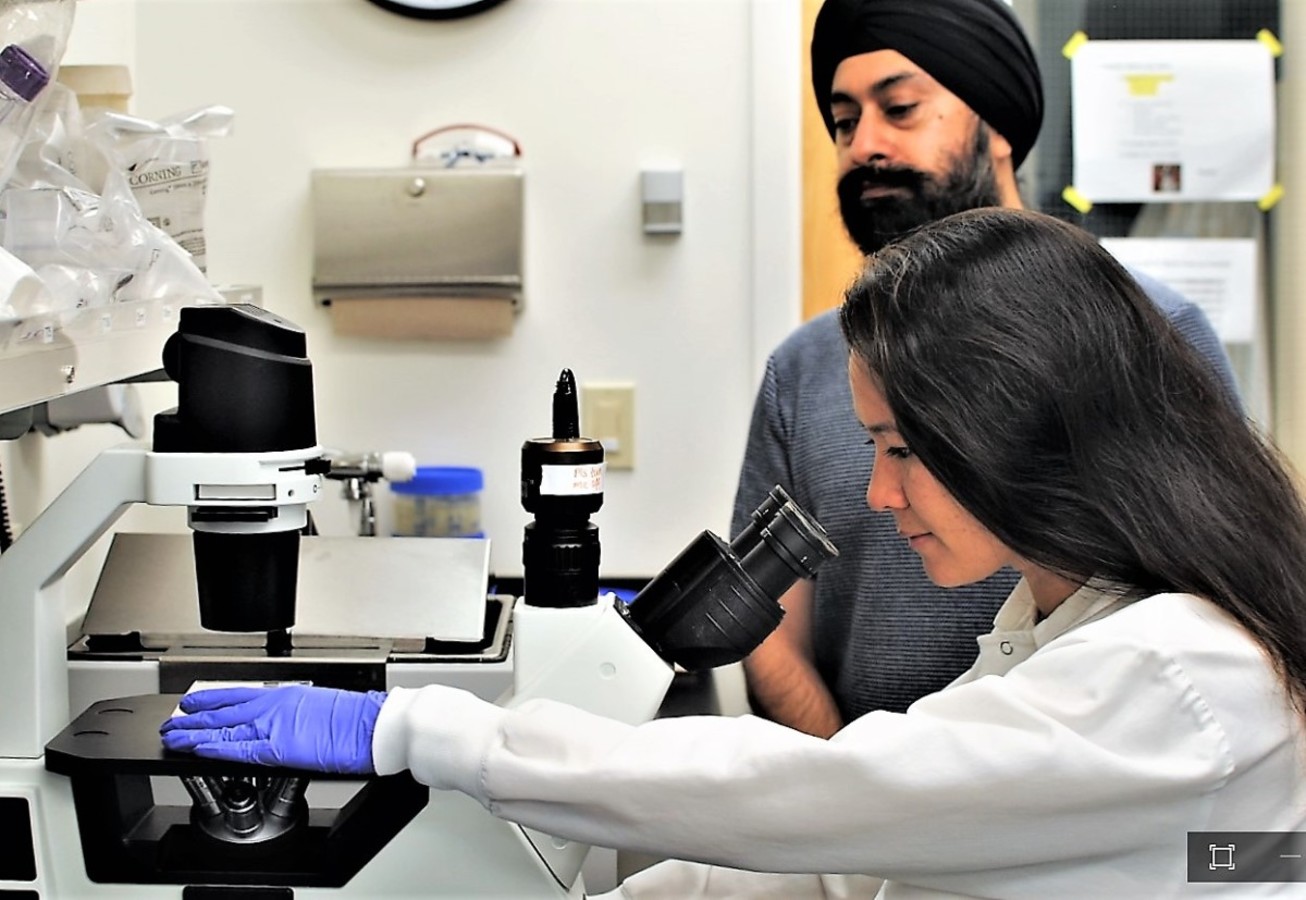
Fred Hutch Post-doctoral Fellow Aleena Arakaki examines specimens while Dr. Taran Gujral oversees her work
Many 12-year-olds focus on sports, the latest video-sharing platform, and wonder how to navigate peer-pressure in middle school. For Aleena Arakaki, the emergence into adolescence was an overwhelming and tragic introduction into the mortality of cancer.
Her mother was diagnosed with tongue cancer and given 6 months to live. She passed away two years later. Soon after, Arakaki’s grandmothers were diagnosed with pancreatic and breast cancer. The former died shortly after her diagnosis; the latter grandmother withstood surgery, radiation, and chemotherapy for seven years, until the cancer metastasized.
“I became determined to learn why this disease had such devastating effects and how we could stop it,” Arakaki said. “These personal experiences drive my passion to further our understanding of cancer biology with the hopes of curing more people of this disease.”
Born and raised on the island of Oahu, Arakaki’s passion is deeply influenced by her Hawaiian culture and heritage. While studying cell and molecular biology at Seattle University, she returned home during the summers of 2010 and 2011 to study alongside Drs. Lenora Loo and Iona Cheng at the University of Hawaii Cancer Center.
“I had no idea of what it meant to have a PhD and didn't know anything about the process of attaining one,” she said. “They introduced and inspired me in the pursuit of a career in cancer research, as well as guided me in the process of applying to graduate school. Their support and mentorship were invaluable at a critical time of my academic career.”
Today, another invaluable source of support and mentorship comes from Dr. Taran Gujral, an associate professor in the Biology Division at Fred Hutchinson Cancer Center. Arakaki has served in his lab as a post-doctoral fellow since November of 2020.
Gujral said he is impressed by Arakaki’s initiative to explore unanswered questions about the spread of cancer.
“What struck me most about Aleena was her willingness to take on new challenges,” he said. “For example, Aleena has been instrumental in leading our lab’s effort to understand molecular mechanisms that drive rare brain cancers. In addition, she has contributed significantly to new methods and technology development as well as training junior scientists in the lab.”
Training and helping others maneuver the myriad aspects of cancer research – and higher education generally – are aspects of her work that motivate Arakaki. She has mentored numerous undergraduate and graduate students while at the Hutch, as well as in her doctorate studies at the University of California, San Diego, where in 2020, she completed her Ph.D. in Biomedical Sciences.
She also is motivated by helping address inequities in science and healthcare.
“The world of academia can be a difficult one in which to survive and thrive, especially for people from historically excluded groups in science,” she said. “There are hurdles that individuals from marginalized groups face that can be discouraging. Those who have faced such adversities, and who have succeeded, are my role models. They have shown me that I, as a Native Hawaiian, can also become successful and can help others find their way professionally. Moreover, they demonstrate resilience in our society through their contributions to the pursuit of knowledge and medical advances.”
__"It’s imperative to ‘give back,’ to engage and inspire young people in learning about science” __
When not peering into a microscopy in Gujral’s lab, Arakaki, 29, helps others “find their way” through a myriad of activities, including:
• The Hutch United Outreach (HUO) Committee, exploring new ways to foster connections between scientists and underrepresented communities • The HUO’s Art Lab Project, highlighting the creative side of science for youth • The Washington State Opportunity Scholarship, providing career mentorship for Washington undergraduate students • Dr. Barbara L. Berg Scientific Career Transition Awardee, working with Dr. Jeanne Chowning, the Hutch’s senior director for science education, to learn more about science education and training.
“I believe it’s imperative to ‘give back,’ to engage and inspire young people in learning about science,” she said. “I’ve gained so much from working with undergraduate students, especially those from marginalized communities. They inspire me as they represent the next generation of committed researchers, clinicians, or both.”


